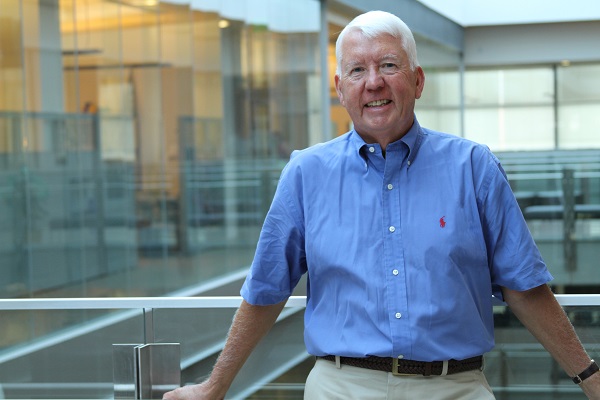Arizona State University Regents’ Professor and research scientist Charles Arntzen, Ph.D., has been named a Fellow of the National Academy of Inventors (NAI).
Arntzen is a pioneer in plant biotechnology and the development of plant-based vaccines and therapeutics for human and animal disease prevention. Referred to as “the godfather of pharming,” Arntzen is best known for playing a key role in developing ZMapp, the first successful treatment against the Ebola virus during the largest outbreak in history. The 2014 Ebola epidemic has resulted in more 28,000 cases and 11,000 deaths.
NAI’s highly prestigious honor is presented to inventors who have demonstrated a prolific spirit of innovation in creating or facilitating outstanding inventions that have made a tangible impact on quality of life, economic development and the welfare of society.
“With this award, Charlie Arntzen has validated our Biodesign Institute mission of improving global health through translational research,” says Sethuraman “Panch” Panchanathan, senior vice president for Knowledge Enterprise Development at ASU. “This prominent honor fittingly acknowledges the impact that his developments will have on current and future generations.”
“It has been incredibly rewarding to see how an idea, considered unconventional at the time we first worked it out in our ASU laboratory, could emerge to be the leading therapeutic for the treatment of Ebola,” Arntzen said. “I was lucky to be in an academic environment that tolerated high-risk, high-reward research, and to be able to work with a skilled multi-disciplinary team.”
During the course of a prolific career, Arntzen and his collaborators have used plants as bioactive factories for the production of life-saving vaccines and therapeutics. These have included plant-based anti-cancer agents, therapeutic agents to protect populations from bioterror threats, proteins to combat rabies, plant-derived vaccines against hepatitis C, vaccines to inoculate recipients against noroviruses and many others.
Arntzen’s long-standing research interests are in plant molecular biology and protein engineering, producing pharmacologically active products in transgenic plants, overcoming health and agricultural constraints in the developing world as well as the use of plant biotechnology for enhancement of food quality and value.
NAI has named 168 leaders of invention and innovation to Fellow status. Those named today, including Arntzen, bring the total number of NAI Fellows to 582, representing more than 190 research universities and governmental and nonprofit research institutes.
Other ASU researchers to receive the award include Stuart Lindsay, Ph.D., director of the Center for Single Molecule Biophysics at the Biodesign Institute, and Michael Kozicki, director of the ASU Center for Applied Nanoionics.
Arntzen, a researcher in the Biodesign Institute’s Center for Infectious Diseases and Vaccinology at ASU, is also professor in the College of Liberal Arts and Sciences’ School of Life Sciences. He was appointed to the Florence Ely Nelson Presidential Endowed Chair at ASU in Tempe in 2000 and named Regents’ Professor in 2004. He served as the founding director of the Biodesign Institute until May 2003 and as co-director of the Center for Infectious Diseases and Vaccinology of that institute until 2007. Arntzen was also named the top creative person in business in 2014 by Fast Company magazine.
In their selection for the fellowship, the NAI honors not only Arntzen’s restlessly innovative spirit but also his dedication to the improvement of human society, through research aimed at reducing suffering and mortality caused by infectious disease.
The NAI Fellows will be inducted on April 15 as part of the fifth annual Conference of the National Academy of Inventors at the United States Patent and Trademark Office.

